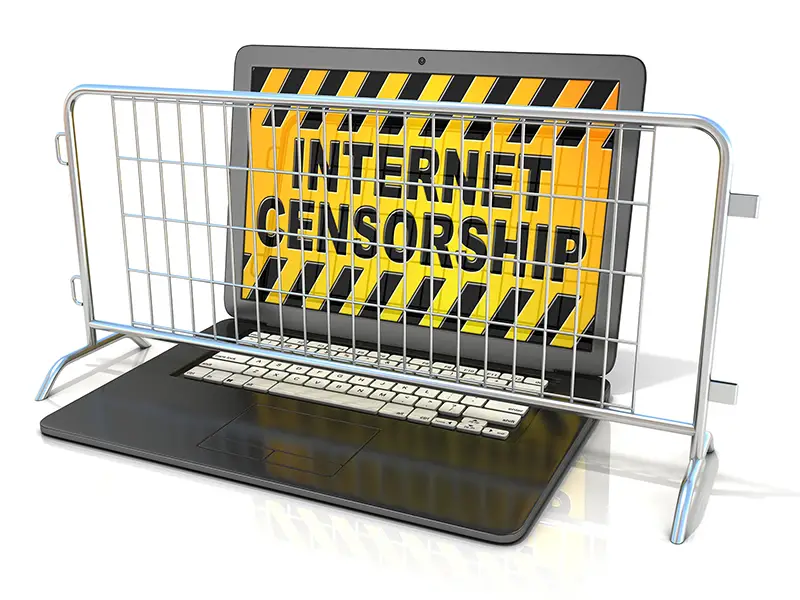Click here to get this post in PDF
A major and admired yet controversial development of technology can be the web. It’s a platform to express oneself and spread information on a global fear. But, despite the advantages it gives thousands of people, it has challenges that cause nations and individuals to demand and enforce online the practice of censorship. So let’s dig into the good and bad of censorship online and learn which is better.
What exactly is Internet Censorship?
It is the process of blocking or banning the majority of the content that could be posted or accessed via the internet. The industries that implement this policy could include government or private companies and individuals who share a common goal: restrict what users can access and share online on the World Wide Web. Some countries directly enforce strict censorship, while others have strict policies against illegal posting online. Some nations have a little leniency when it comes to viral videos.
The tense issue of the amount of information that is needed to be available on the web and whether it is necessary to have any kind of censorship remains to be fought between those who support and the critics. Here’s a look at the most prominent advantages and disadvantages of both groups.
Advantages and disadvantages of censorship of Internet
The advantages
It will save children from being victims of sex trafficking and pornography.
Every year thousands of children become victims of internet bullying, abuse and pornography. Paedophiles lure innocent children into porn, sexual encounters and even trafficking. So censorship of the internet saves children from such evildoers.
A free society must be able to set the limits.
Certain journalists who support online censorship believe in the freedom of expression and speech, but there shouldn’t be total freedom of speech and expression. If there’s no restriction of any kind, some people could be the victims of cyberbullying and racist speech. This shouldn’t be the scenario. This kind of behavior should not be tolerated in cyberspace.
It aids in strengthening security in the country.
National security is protected by enacting laws that prohibit hacking and inflicting severe punishment for those who violate the law. Without any form of censorship, it will be difficult to prevent bad actors or terrorists from gaining access to information that could threaten the security of the country.
It decreases the chances of identity theft.
Internet censorship advocates claim that by restricting what information can be accessed online, private data cannot be easily accessed. With the use of anti-phishing software that acts as a type of internet censorship because it alerts users that the application is trying to gain access, it provides users with the opportunity to stop hackers and corporations from accessing relevant information.
Disadvantages
It stifles freedom to express opinions and deprives individuals of the opportunity to discover the truth.
The opponents of internet censorship claim that by making it legislation, liberty of speech, expression, and the press is taken away and constitutes in violation of the First Amendment, which includes the prohibition of enacting an act that restricts the freedom of expression and speech, in addition to other rights. They argue that censorship could be in violation of this amendment. Furthermore, if individuals aren’t given the opportunity to know the truth, this could cause ignorance.
It could be utilized for government purposes to hide important details from the public.
They also claim that if a law is implemented on internet censorship, insensitive officials from the government can be able to continue their illegal ways of conducting business, like corrupt practices and abuse of power. A leader in the government could, for instance, restrict the release of videos or online material that proves their illegal actions by imposing a news blackout. They also assert that dictators are able to use this to limit the release of pictures and stories that be for personal gain and not for the benefit of the people who are their supporters.
People are able to practice self-autonomy.
Certain groups who oppose restricting access to content argue that users determine what they read and see, which makes it unimportant to have laws that prohibit content on the internet. They also argue that parents must take the time to check the content their children search online, which is one of their duties as parents.
Conclusion
The debate over internet censorship will be a hot issue. Both sides have important concerns about determining what websites can be accessed and published. Other countries such as China and Turkey are insistent on prohibiting content they feel is inappropriate. Maybe internet censorship ought to be controlled to achieve a balance, though total censorship may not be the answer.
You may also like: How to Build Your Online Security
Image source: Shutterstock.com


